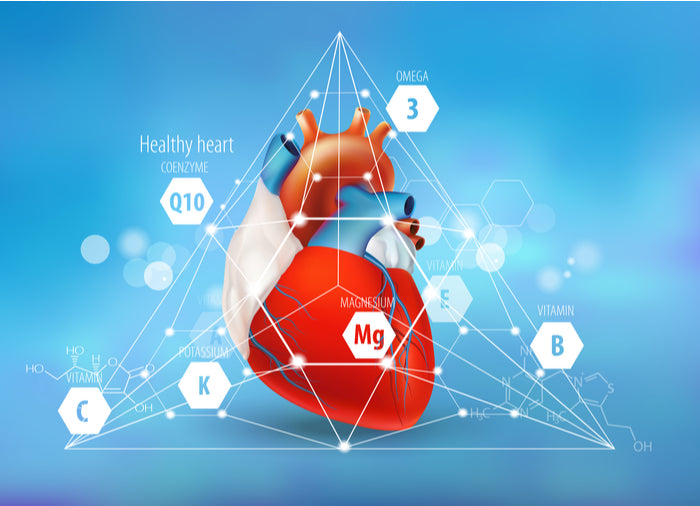
Cardiovascular diseases (CVDs) is a collective term used to describe diseases associated with the heart and the vascular system. Cardiovascular disorders are the leading cause of death worldwide.1 The most common types of CVDs are coronary artery disease, cardiac arrest, congestive heart failure, arrhythmia, congenital heart disease, stroke, peripheral artery disease, and high blood pressure (hypertension).2 According to research published by the American Heart Association, 17.6 million deaths in 2016 were attributed to CVD globally, which amounted to an increase of 14.5% from 2006.3
There are several risk factors associated with CVDs, including the use of tobacco, alcohol consumption, unhealthy diet, lack of physical activity, hypertension, and obesity.4 Diet and nutrition are important factors associated with CVDs. Over the last few decades, much emphasis has been given to understand the role of several diet plans and dietary supplements.5 A number of dietary supplements such as omega-3 fatty acids (DHA and EPA), minerals (low-sodium and magnesium), antioxidants, phytosterols, and homocysteine-reducing agents were reported to be effective in lowering the risk of CVDs.6 Additionally, fish oil, multivitamins, probiotics, and CoQ10 were suggested as being beneficial in reducing the risk of CVD.7
Coenzyme Q-10 is a naturally occurring quinone that acts as a cofactor in the electron-transport chain. It is found in most aerobic organisms from bacteria to mammals and aids in the synthesis of adenosine triphosphate (ATP—energy currency of cells). Several synonyms are used for this essential nutrient, such as Coenzyme Q, CoQ, CoQ10, Ubiquinone, Ubiquinone-Q10, Ubidecarenone, or Vitamin Q10. CoQ10 functions in the mitochondrial inner membrane to transfer electrons between protein complexes.8,9 The major forms of CoQ10 are ubiquinone and ubiquinol. The biosynthesis of ubiquinol (antioxidant form) occurs from ubiquinone.10,11
CoQ10 possesses excellent antioxidant properties, that’s why it is a potent free radical scavenger, and it also inhibits lipid peroxidation. CoQ10 levels decrease with age, that’s why by increasing CoQ10 levels through supplementation, you can make sure that CoQ10 continues to perform its functions as well as it used to.12
CoQ10 is one of the most commonly used dietary supplements due to its beneficial role in cardiovascular diseases, high blood pressure, cancer, periodontal diseases, mitochondrial disorders, radiation injury, obesity, diabetes, Parkinson's disease, acquired immune deficiency syndrome (AIDS), gastric ulcers, allergies, migraine headaches, kidney failure, muscular dystrophy, and aging.8 Studies have shown that dietary supplementation with CoQ10 improves overall cardiovascular health. These are some of the ways CoQ10 can help you:
Coronary heart disease is a consequence of plaque inside the coronary artery that restricts blood flow. Further, chronic inflammation and oxidative stress may enhance the risk of coronary heart disease.13 It was reported that CoQ10 supplementation significantly reduces the level of oxidative stress and inflammation. Research findings have demonstrated that CoQ10 enhanced antioxidant enzyme activities and lowered inflammation, which could be beneficial in coronary heart disease.14
Atherosclerosis is an inflammatory disease that is characterized by the formation of cholesterol plaque on the walls of large- and medium-sized arteries.15 Oxidative modification of low-density lipoprotein (LDL) in arterial walls is an early sign of the development of atherosclerosis. Research findings have demonstrated that CoQ10 inhibits lipoprotein and LDL oxidation which results in reduced risk of atherosclerosis.16
Heart failure, scientifically known as congestive heart failure, is a chronic condition when cardiac muscles are unable to sufficiently pump blood. An ejection fraction is a measure of heart ventricle capacity to pump out blood, and a low ejection fraction is an early sign of congestive heart failure.17 CoQ10 was reported to be beneficial in improving ejection fraction in patients with congestive heart failure.18
Angina is characterized by chest pain due to the inadequate supply of oxygenated blood to the cardiac tissue. It might be a cholesterol plague or blood clot in the coronary artery resulting in an ischemic condition that forces the muscle to opt for alternate pathways for energy production.19 CoQ10 was reported to be effective in reducing the risk of atherosclerosis and improving exercise tolerance as well. Collectively, CoQ10 offers substantial relief during angina.20
Hypertension is one of the most crucial risk factors for CVD. It was reported that CoQ10 supplementation significantly reduces systolic blood pressure. However, the effect of CoQ10 on diastolic blood pressure was not significant.21 You can take other natural supplements, such as garlic, potassium, or omega-3 fatty acids, together with CoQ10 to see more improvement in both systolic and diastolic blood pressure.22
Additionally, dietary intake of CoQ10 helps to reduce other cardiovascular risk factors, including endothelial dysfunction, inflammation, and blood lipids level. High cholesterol levels restrict endothelial mediated vasodilation affecting blood pressure. Dietary intake of CoQ10 helps to improve the blood flow and reduce the risk of CVD.23 Taking CoQ10 significantly reduces plasma lipoproteins which decreases the risk of CVD.24
Statins play an effective role in the prevention of cardiovascular disease and treatment of hypercholesterolemia. However, use of statins may lead to a variety of muscle myopathies, due to inhibition of the endogenous synthesis of coenzyme Q10 by statins. It was observed, however, that supplementation with CoQ10 may decrease muscle pain associated with statin treatment. Thus, taking CoQ10 daily may be beneficial for people on statin therapy with no noted side effects.26,27
References